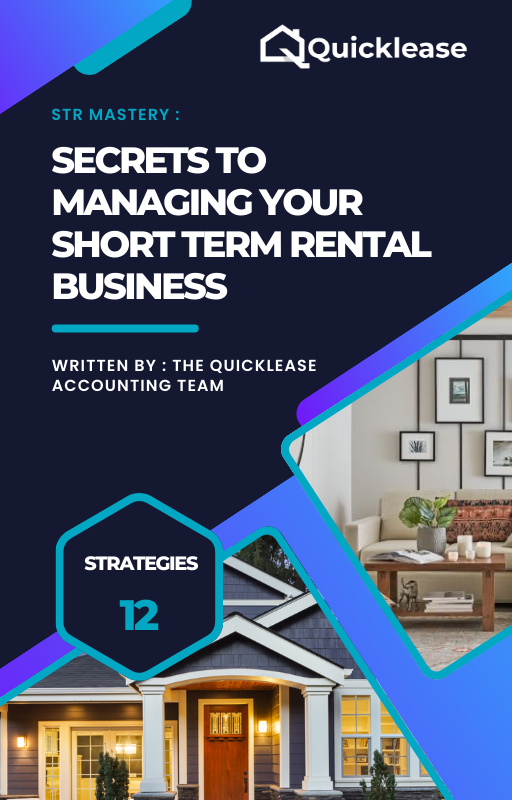Chapter 10: Tax Strategies for STR Owners

Yours Free
12 strategies to streamline short term rental management and increase profitability
Welcome: Mastering the Tax Landscape for Your STR Business
Welcome back! As you continue to expand your short-term rental (STR) business, understanding how taxes impact your bottom line becomes crucial. Proper tax management isn’t just about compliance—it’s a strategic tool to maximize your profits and grow your business. In this chapter, we’ll walk you through the essential tax obligations for STR owners, reveal the most beneficial deductions, explain depreciation in straightforward terms, offer practical tips for staying on top of tax deadlines, and guide you on how to collaborate effectively with tax professionals. Let’s navigate the complex but rewarding world of taxes together.

Basic Tax Obligations: What You Need to Know as a New STR Owner
Running an STR means you’re managing a small business, with tax obligations that can significantly affect your financial health. Knowing these obligations inside and out will not only keep you compliant but also help you optimize your returns.
1. Rental Income Tax: Reporting and Paying
The income you earn from your STR is subject to federal income tax, just like any other business income. You’ll need to report this on your tax return using Schedule E (Form 1040), which allows you to list your rental income, deductible expenses, and ultimately, your net income or loss.
For many first-time STR owners, understanding the nuances of rental income tax can be overwhelming. However, staying informed is crucial. Every penny you earn from renting your property must be accounted for, whether you receive it from a booking platform like Airbnb or directly from guests. Even if you rent out part of your home or only occasionally host guests, this income is taxable.
2. Self-Employment Tax: Do You Qualify?
If your involvement in the STR business extends beyond just providing a place to stay—such as offering daily cleaning, meals, or concierge services—the IRS might classify you as self-employed. This classification triggers self-employment taxes, which cover Social Security and Medicare contributions, typically amounting to 15.3% of your net earnings.
Why does this matter? The distinction between passive rental income and active business income is critical. Passive income from property rental isn’t subject to self-employment tax, but if your services cross the line into more active business operations, you’ll be on the hook for additional taxes. Understanding where your activities fall on this spectrum can save you significant amounts in taxes.
3. State and Local Taxes: What to Watch For
Beyond federal taxes, state and local taxes can take a bite out of your rental income. These taxes vary widely by location and can include sales tax, occupancy tax, or transient lodging tax. For example, many cities and counties impose an occupancy tax that guests pay when they stay at your property. Depending on where you operate, you might need to collect and remit this tax yourself, or it may be handled by platforms like Airbnb or VRBO.
Being proactive about these taxes is essential. The rules can differ not just from state to state, but from city to city. Failing to collect or remit the correct taxes can lead to hefty fines and penalties, so make sure you’re up to date with local regulations.
4. Capital Gains Tax: Selling Your STR Property
Capital gains tax applies when you sell your STR property for a profit. The tax is calculated on the difference between the sale price and your adjusted basis (which includes the original purchase price, plus improvements, minus depreciation). If the property was your primary residence for at least two of the last five years, you may qualify for a substantial exclusion—up to $250,000 ($500,000 if married filing jointly)—which can dramatically reduce or even eliminate your capital gains tax liability.
However, if the property was solely used as an STR, you’ll be subject to capital gains tax on any profit. This makes tax planning crucial if you anticipate selling your property. Timing the sale and understanding how your depreciation deductions impact your tax liability can help you keep more of your profits.
Example:
Imagine you’ve owned an STR for five years and decide to sell it. Your property has appreciated by $150,000, but you’ve also claimed $50,000 in depreciation. When calculating your capital gains, you’d owe taxes on $200,000 ($150,000 gain + $50,000 depreciation recapture). Understanding these tax implications before selling can help you make informed decisions and avoid unexpected tax bills.

Common Deductions: How to Maximize Your Tax Savings
Why Deductions Are Critical
Deductions reduce your taxable income, which in turn lowers the amount of tax you owe. The more deductions you can legitimately claim, the more money you keep in your pocket. As an STR owner, there are several key deductions that can significantly reduce your tax burden.
1. Mortgage Interest: A Major Deduction
Mortgage interest is often the largest deduction available to property owners. If you have a mortgage on your STR, the interest you pay is fully deductible, which can amount to thousands of dollars in tax savings each year, particularly in the early stages of your loan when interest payments are highest.
2. Property Taxes: Don’t Miss This Opportunity
Property taxes are another major deduction. Whether your property is located in a high-tax area or not, you can deduct the full amount of property taxes paid. This deduction is straightforward but essential, especially if you own property in an area with high property taxes.
3. Depreciation: The Hidden Gem
Depreciation might seem complex, but it’s one of the most valuable deductions for STR owners. The IRS allows you to deduct the cost of your property over 27.5 years (for residential properties), which spreads out the tax benefits over a long period. This deduction recognizes the “wear and tear” on your property, even if it’s increasing in market value.
The key here is that depreciation isn’t optional—it’s a mandatory deduction you must take if you qualify. And while depreciation reduces your taxable income each year, it also lowers your property’s tax basis, which can increase your capital gains tax when you sell. But don’t let that scare you off—strategic planning can help you manage these future taxes effectively.
4. Maintenance and Repairs: Immediate Deductions
Maintenance and repair costs can be deducted in the year they are incurred, making them powerful tools for reducing your tax liability. Routine expenses like landscaping, cleaning, or minor repairs (such as fixing a broken appliance) are fully deductible.
However, it’s crucial to distinguish between repairs (which are deductible) and improvements (which must be depreciated over time). For example, replacing a broken window is a repair, while adding a new deck is an improvement. Understanding this distinction can help you plan your expenses to maximize tax benefits.
5. Utilities and Services: Every Little Bit Helps
If you pay for utilities like electricity, gas, water, or internet at your STR property, these costs are deductible. Additionally, any services you pay for, such as cleaning, lawn care, or security systems, can also be deducted. Keeping detailed records of these expenses is crucial, as they can add up and provide significant tax savings.
6. Insurance Premiums: Protection That Pays Off
The cost of insuring your rental property is fully deductible, including landlord insurance and private mortgage insurance (PMI). Given the importance of protecting your investment, this deduction not only helps lower your tax bill but also ensures you’re adequately covered.
Example:
Let’s say your STR generates $50,000 in rental income annually. You pay $10,000 in mortgage interest, $3,000 in property taxes, $5,000 in maintenance and repairs, $2,500 in utilities, and $1,500 in insurance. These deductions total $22,000, reducing your taxable income to $28,000. The tax savings from these deductions can be substantial, making a big difference in your overall profitability.

Introduction to Depreciation: How It Works and Why It’s Beneficial
What Is Depreciation? Depreciation is a tax deduction that allows you to recover the cost of your property over time. The IRS assumes that buildings wear out or lose value over time, so they allow you to deduct this loss in value each year, even if your property is actually appreciating in market value.
1. Understanding the Basics
For residential rental properties, the IRS uses a depreciation period of 27.5 years. This means you can deduct a portion of your property’s value every year over that period. However, you can only depreciate the building, not the land it sits on, as land is considered to retain its value.
To calculate your annual depreciation deduction, divide the cost basis of the building (the purchase price minus the value of the land) by 27.5. For example, if you purchased a rental property for $275,000 and the land is valued at $50,000, the cost basis of the building is $225,000. Your annual depreciation deduction would be $225,000 ÷ 27.5 = $8,182.
2. Depreciating Improvements: Adding to Your Deductions
Significant improvements to your property, such as adding a new roof, upgrading the HVAC system, or remodeling the kitchen, can also be depreciated. These improvements must be capitalized and depreciated over their useful life, which varies depending on the type of improvement. Typically, improvements are depreciated over 5, 7, or 15 years.
For STR owners, keeping track of these improvements and their respective depreciation schedules is critical. Each improvement increases your deductions, which in turn reduces your taxable income.
3. Recapture of Depreciation: What You Need to Know
When you sell your property, the IRS will “recapture” the depreciation you’ve claimed, meaning you’ll need to pay taxes on it. This recapture is taxed at a higher rate than capital gains, typically 25%. However, the benefits of taking depreciation deductions over the years often outweigh the costs of recapture.
Strategic tax planning is essential to managing depreciation recapture. For instance, timing the sale of your property to coincide with years where your income is lower can reduce the overall tax impact. Alternatively, rolling over the sale proceeds into another investment property using a 1031 exchange can defer the recapture entirely.
Example:
Suppose you’ve owned an STR for 10 years and claimed $81,820 in depreciation deductions. If you sell the property for a profit, the IRS will require you to recapture the $81,820 and pay taxes on it at 25%. While this can seem daunting, the tax savings you’ve accumulated over the years often make depreciation a valuable strategy.

Staying Ahead of Tax Deadlines: Practical Tips for Year-Round Readiness
Taxes aren’t just a once-a-year task—they require ongoing attention to avoid last-minute stress and potential penalties. Here are some strategies to help you stay on top of your tax obligations year-round.
1. Use Accounting Software Like Quicklease
Accounting software is a game-changer for STR owners. Quicklease, designed specifically for STR businesses, automates much of the record-keeping process, ensuring that your financial records are accurate and up-to-date. Quicklease can help you track income, expenses, and generate the necessary reports for tax filing, reducing the risk of errors and making tax time less stressful.
2. Set Aside Money for Taxes
As an STR owner, you may not have taxes withheld from your income throughout the year, meaning you’ll need to make estimated tax payments. It’s a good idea to set aside a portion of your income—typically 25-30%—to cover these taxes. Quicklease’s budgeting tools can help you manage this, ensuring you have enough saved when tax deadlines approach.
3. Keep Detailed Records
Keeping detailed records of all your income and expenses is crucial for accurate tax reporting. This includes receipts, invoices, bank statements, and any other documentation related to your STR business. Quicklease allows you to store digital copies of these records, making them easy to organize and access.
4. Mark Important Tax Dates
Missing a tax deadline can result in penalties and interest, which can add up quickly. Mark all relevant tax deadlines on your calendar, including quarterly estimated tax payments, filing deadlines for your annual return, and any local tax due dates. Quicklease’s calendar feature can send you reminders, helping you stay on track.
Example:
Let’s say you’ve been diligently using Quicklease to manage your STR finances. Throughout the year, you regularly update your income and expenses, categorize transactions, and store receipts in the platform. As tax season approaches, you use Quicklease to generate a comprehensive tax report, which you then provide to your CPA. This proactive approach ensures you’re fully prepared and avoids the last-minute scramble many business owners face.

Working with Tax Professionals: How to Find the Right CPA and What to Expect
Navigating the complexities of tax law can be challenging, especially as your STR business grows. A Certified Public Accountant (CPA) can provide invaluable guidance, helping you maximize deductions, avoid costly mistakes, and plan for the future. Here’s how to find the right CPA for your STR business and what you can expect from them.
1. Finding the Right CPA
When looking for a CPA, it’s important to find someone with experience in real estate and STR businesses. A CPA who understands the nuances of STR tax laws can help you take advantage of all available deductions and credits. You can start by asking for recommendations from other STR owners or by searching online directories like the American Institute of CPAs (AICPA).
2. What to Expect from Your CPA
A good CPA will do more than just prepare your tax return—they’ll help you develop a tax strategy that aligns with your business goals. This includes advising on deductions, helping you plan for capital gains, and ensuring compliance with all applicable tax laws. Additionally, your CPA should be available year-round to answer any questions and provide guidance as your business evolves.
3. The Cost of Hiring a CPA
While hiring a CPA is an investment, it often pays for itself through the tax savings and peace of mind it provides. The cost of hiring a CPA varies depending on the complexity of your return and the services provided, but many STR owners find that the benefits far outweigh the costs.
Example:
You’ve been managing your STR business on your own, but as it grows, you decide to hire a CPA. After researching and finding a CPA with experience in real estate, you schedule a consultation. The CPA reviews your financials, identifies additional deductions you weren’t aware of, and helps you plan for the next tax season. With their help, you feel confident that your taxes are in good hands, allowing you to focus on expanding your business.
Conclusion and Transition to Chapter 11: Scaling Your STR Portfolio
Understanding and managing your tax obligations is a crucial part of running a successful STR business. By taking advantage of available deductions, understanding depreciation, staying organized, and working with a knowledgeable CPA, you can minimize your tax burden and maximize your profits. As we move into Chapter 11, we’ll explore how to scale your STR portfolio, taking your business to the next level. Let’s continue building your STR success story!








